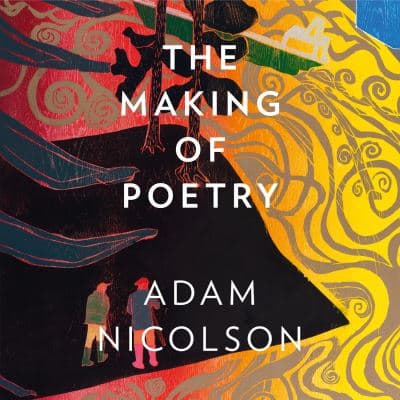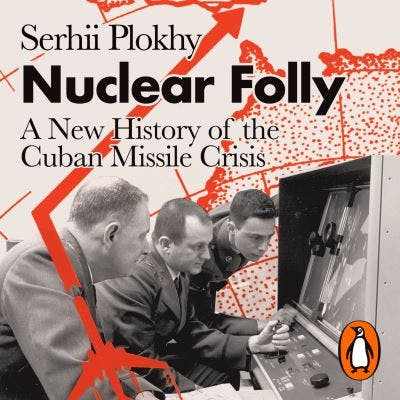Roger Davis
- History - European
Read by: Roger Davis
Duration: 11 hrs 41 mins
In A Brief History of Germany, Jeremy Black questions how the Germany we know today came to be, chronicling the events that shaped its past, present and future in a fascinating new way.
From the fall of Rome in the 1500s to the enlightenment in the 1700s, from World War I and World War II to Germany post-unification, Black's writing will unlock the places and people that formed Germany and enrich your visit with stories of its society and culture.
Concise yet explorative, A Brief History of Germany is an astonishing work from a renowned UK historian. Whether you are a long-term reader of Black's expansive history work or are interested in learning more ahead of a short city break or longer trip, this intriguing look at the history of Germany is an essential read.
- History - World
Read by: Roger Davis
Duration: 9 hrs 57 mins
The Atlantic has borne witness to major historic events that have drastically shaped humanity with each crossing of its path. In this broad and readable book, Jeremy Black takes the reader through its evolution to becoming one of the most important oceans in the world.
Black discusses the importance of the Atlantic in relation to world history as well as addressing topics such as those bravest to attempt to cross the ocean before Columbus, the beginnings of slavery from 1400-1600, the struggle for control between empires in the 1600s, the way technology adapted with steamships to telegraph cables, the battle of the Falkland, and the Cold War.
Black also touches on the Atlantic we know today, and the struggles it faces due to urgent global issues including climate change, pollution, and the trials of the economic rise in the Indo-Pacific world. - War - General
Read by: Roger Davis
Duration: 12 hrs 51 mins
Goose Green was the first land battle of the Falklands War. It was also the longest, the hardest-fought, the most controversial and the most important to win. What began as a raid became a vicious, 14-hour infantry struggle, in which 2 Para - outnumbered, exhausted, forced to attack across open ground in full daylight, and with inadequate fire support - lost their commanding officer, and almost lost the action.
This is the only full-length, detailed account of this crucial battle. Drawing on the eye-witness accounts of both British and Argentinian soldiers who fought at Goose Green, and their commanders' narratives, it has become the definitive account of most important and controversial land battle of the Falklands War.
A compelling story of men engaged in a battle that hung in the balance for hours, in which Colonel 'H' Jones' solo charge against an entrenched enemy won him a posthumous V.C., and which for both sides was a gruelling and often terrifying encounter. - History - General
Read by: Roger Davis
Duration: 15 hrs 30 mins
Was the 1960s really that great time of liberation, joyful experimentation and celebration of youth? Growing Up takes an unflinching look at the dark underbelly of the sexual revolution.
No era in recent history has been both more celebrated and vilified than the 1960s. For some it was a time when music, fashion and drugs enabled young people to express their individuality and freedom, their hopes and dreams of a different, perhaps better, world. For others, the decade marked the advent of the permissive society, with its undermining of authority, family values and common decency. At the heart of this continuing controversy is sex.
For this wide-ranging and eye-opening survey of the sexual landscape of the 1960s Peter Doggett has assembled a dozen little-known stories that reveal how the sexual revolution transformed people's lives. Growing Up provides an honest, often disturbing portrait of a constant battle between two forces: the urge to free the body from guilt and restraint; and the desire to control, cannibalise and exploit that liberation for profit or pleasure. It is a battle that divides opinion to this day. - Biography - General
Read by: Roger Davis
Duration: 20 hrs
The story of Frank Whittle – RAF pilot, mathematician of genius, inventor of the jet engine and British hero. In 1929, a twenty-two-year-old maverick named Frank Whittle – a self-taught aeronautical obsessive and risk-takingly brilliant RAF pilot – presented a blueprint for a revolutionary, jet-powered aircraft engine to the Air Ministry. His idea had the potential to change the course of history, but it was summarily rejected. In this meticulously researched biography, Duncan Campbell-Smith charts Whittle's stoic efforts to build his jet engine in the interwar years, during which he was constantly frustrated to find his ground-breaking project impeded by bureaucratic inertia until the outbreak of war in 1939. Eventual recognition of the importance of his work by the British government came too late for Whittle's invention to play a major part in the Second World War, but after the war his dream of civilian jet powered aircraft was gradually realized – eventually transforming the entire world of air travel. Gripping in its narrative, authoritative in its technical detail and insightful in its judgements, Jet Man is the definitive telling of the life of an engineering icon and unjustly neglected British hero of the Second World War – and a tantalizing tale of 'what might have been'.
- Arts General
Read by: Roger Davis
Duration: 12 hrs 15 mins
The year in the late 1790s that Coleridge, Wordsworth and his sister Dorothy spent together in the Quantock Hills, is the most famous year in English poetry. Out of it came 'The Ancient Mariner' and 'Kubla Khan' as well as Wordsworth's 'Lyrical Ballads' and the greatness of 'Tintern Abbey'. The idea that these poems came from this place, and that only by experiencing the physical circumstances of the year, in all weathers and all seasons, can the genesis of the poetry start to be understood.
- History - World
Read by: Roger Davis
Duration: 14 hrs 38 mins
For more than four weeks in the autumn of 1962 the world teetered. The consequences of a misplaced step during the Cuban Missile Crisis could not have been more grave. Ash and cinder, famine and fallout; nuclear war between the two most-powerful nations on Earth. In Nuclear Folly, award-winning historian Serhii Plokhy tells the riveting story of those weeks, tracing the tortuous decision-making and calculated brinkmanship of John F. Kennedy, Nikita Khrushchev and Fidel Castro, and of their advisors and commanders on the ground.
More often than not, Plokhy argues, the Americans and Soviets simply misread each other, operating under mutual distrust, second-guesses and false information. Despite all of this, nuclear disaster was avoided thanks to one very human reason: fear. Drawing on an impressive array of primary sources, including recently declassified KGB files, Plokhy masterfully illustrates the drama of those tense days. Authoritative, fast-paced and unforgettable, this is the definitive new account of the Cold War's most perilous moment.
- History - World
Read by: Roger Davis
Duration: 5 hrs 9 mins
The Enlightenment did not begin in Europe. Its true origins lie thousands of miles away on the island of Madagascar, in the late seventeenth century, when it was home to several thousand pirates. This was the Golden Age of Piracy - but it was also, argues anthropologist David Graeber, a brief window of radical democracy, as the pirate settlers attempted to apply the egalitarian principles of their ships to a new society on land.
In this jewel of a book, Graeber offers a way to 'decolonize the Enlightenment', demonstrating how this mixed community experimented with an alternative vision of human freedom, far from that being formulated in the salons and coffee houses of Europe. Its actors were Malagasy women, philosopher kings and escaped slaves, exploring ideas that were ultimately to be put into practice by Western revolutionary regimes a century later.
- War - General
Read by: Roger Davis
Duration: 15 hrs 16 mins
Sharkey Ward commanded 801 Naval Air Squadron, HMS Invincible, was senior Sea Harrier adviser to the Command, flew over sixty missions and was awarded DSC. Yet had he followed all his instructions to the letter, Britain might well have lost the Falklands War.
His dramatic first-hand story of the air war in the South Atlantic is also an extraordinary, outspoken account of inter-Service rivalries, bureaucratic interference, and dangerous ignorance of the realities of air combat among many senior commanders.
As Sharkey Ward reveals, the 801 pilots were fighting not just the enemy, exhaustion, and the hostile weather, but also the prejudice and ignorance of their own side.
- Previous<
- Page1
- Next>








